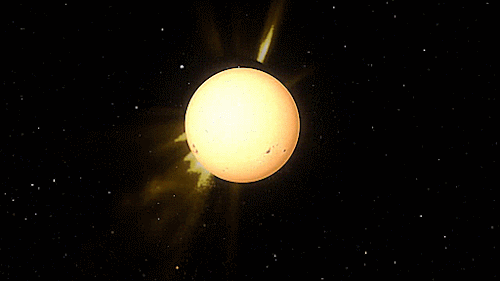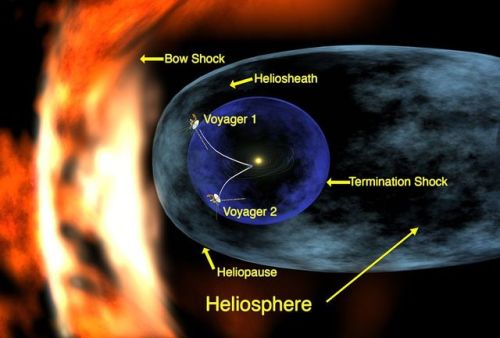Galaxy Center
Galaxy Center

Picture of the day - November 6, 2018
The center of the Large Magellanic Cloud Galaxy, according to space engine.
More Posts from Sharkspaceengine and Others



Pictures of the day 2 - December 9, 2018
Insight B System - Moons of the sixth planet
Here we have a few views of the system’s sixth planet viewed from the surfaces of the three inner-most moons.
High Resolution Pictures
View from the inner-most moon
View from the second moon
View from the third moon




The heliosphere is the bubble-like region of space dominated by the Sun, which extends far beyond the orbit of Pluto. Plasma “blown” out from the Sun, known as the solar wind, creates and maintains this bubble against the outside pressure of the interstellar medium, the hydrogen and helium gas that permeates the Milky Way Galaxy. The solar wind flows outward from the Sun until encountering the termination shock, where motion slows abruptly. The Voyager spacecraft have explored the outer reaches of the heliosphere, passing through the shock and entering the heliosheath, a transitional region which is in turn bounded by the outermost edge of the heliosphere, called the heliopause. The shape of the heliosphere is controlled by the interstellar medium through which it is traveling, as well as the Sun and is not perfectly spherical. The limited data available and unexplored nature of these structures have resulted in many theories. The word “heliosphere” is said to have been coined by Alexander J. Dessler, who is credited with first use of the word in the scientific literature.
On September 12, 2013, NASA announced that Voyager 1 left the heliopause on August 25, 2012, when it measured a sudden increase in plasma density of about forty times. Because the heliopause marks one boundary between the Sun’s solar wind and the rest of the galaxy, a spacecraft such as Voyager 1 which has departed the heliosphere, can be said to have reached interstellar space. source
Lunar Rings


Pictures of the Day - October 21, 2018
Normally, giant planets are the ones with rings, but in some situations a moon of a gas giant can have its own rings. Here we come across such a satellite.







O’Srius System - Post 3 (Stunning World)
Here we come across the smaller component of a double planetary system, being the 9 and 10th planets from the star. This planet is by far the most visually stunning world I have come across in the 6 months of playing space engine.
The world is roughly the same size as Earth, but only 0.58 times the mass. The surface is covered in liquid nitrogen oceans and nitrogen ice-caps. The planet has a surface temperature of 68 K or -337 °F. The atmosphere is composed of nitrogen and argon with a surface pressure of 0.095 atmospheres. The surface has a nitrogen cycle, much the same as Earth has a water cycle.
High Resolution Pics
Picture 1 - Crescent
Picture 2 - Gibbous
Picture 3 -
Picture 4 - River Channels
Picture 5 - Varied terrain
Picture 6 - Polar Cap
Picture 7 - Nitrogen Shoreline
Pillowfort reopens new user registrations at 10 am est
Pillowfort has finally reopened new user registrations which will begin at 10 am eastern. There is a small $5 fee until the site is no longer in beta. I have permanently switched all my posts over there. I’ll be posting a follow up post with my blog link later today

Picture of the Day - February 13, 2019 (Late post)
Uniquely colored desert world with life.

Picture of the day - February 15, 2019
Gas giant with vivid violet rings.

Picture of the day 2 - November 28, 2018
Cratered surface of a small burnt dwarf planet. Fissures run through the surface from the core cooling and the crust shrinking.

For scientists watching the Red Planet from our orbiters, the past month has been a windfall. “Global” dust storms, where a runaway series of storms create a dust cloud so large they envelop the planet, only appear every six to eight years (that’s 3-4 Mars years). Scientists still don’t understand why or how exactly these storms form and evolve.
Read the full story HERE.
Make sure to follow us on Tumblr for your regular dose of space: http://nasa.tumblr.com.
-
 sharkspaceengine reblogged this · 6 years ago
sharkspaceengine reblogged this · 6 years ago
My Space Engine Adventures, also any space related topic or news. www.spaceengine.org to download space engine. The game is free by the way. Please feel free to ask me anything, provide suggestions on systems to visit or post any space related topic.Check out my other blog https://bunsandsharks.tumblr.com for rabbit and shark blog.
294 posts









